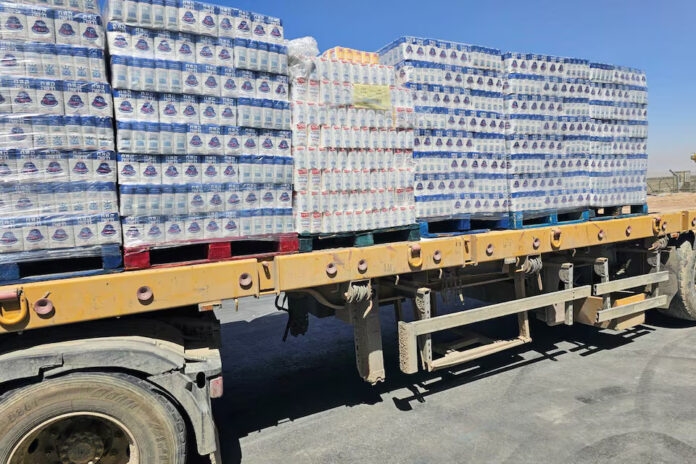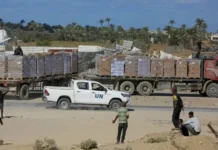
Israel has announced a new mechanism to allow the gradual and controlled entry of humanitarian goods into the Gaza Strip through local merchants, a move aimed at expanding aid access amid growing international alarm over a deepening humanitarian crisis in the war-torn enclave.
The Israeli military’s Coordination of Government Activities in the Territories (COGAT) said Tuesday that the cabinet has approved a plan to permit the delivery of basic supplies, such as food products, baby formula, fruits and vegetables, and hygiene items, through private sector channels rather than relying solely on international aid organisations.
“The goal is to increase the volume of aid entering the Gaza Strip while reducing reliance on the United Nations and other international bodies,” COGAT said in a statement.
It remains unclear how the new system will function on the ground, given the widespread destruction of infrastructure across Gaza. Palestinian and UN officials estimate the territory needs approximately 600 aid trucks per day to meet basic needs; the same number Israel allowed before the war erupted.
The announcement comes amid disturbing images of severely malnourished Palestinian civilians, including children, and a recent video released by Hamas showing an emaciated Israeli hostage, which sparked outrage from Western governments. Israel has faced mounting pressure to ease restrictions and facilitate aid delivery, prompting recent measures such as temporary ceasefires, airdrops, and the designation of protected routes for convoys.
In response, Hamas has stated its willingness to coordinate with the Red Cross to deliver aid to hostages it holds, provided Israel opens humanitarian corridors and suspends airstrikes during aid distribution.
Israel and the U.S. have advocated for aid distribution via the Gaza Humanitarian Foundation (GHF), a private entity backed by a U.S. logistics firm employing ex-CIA and military personnel. However, the United Nations has rejected the model, citing concerns over neutrality and accusations that it militarises aid and displaces civilians.
The U.N. says over 1,000 Palestinians have been killed since May near aid distribution sites, most around GHF-controlled areas. GHF denies the claims, stating that the deadliest incidents occurred near other convoys.
The conflict began on October 7, 2023, when Hamas launched a deadly assault on southern Israel, killing around 1,200 people and taking 251 hostages, according to Israeli officials. Since then, Israel’s retaliatory campaign has killed over 60,000 Palestinians, according to Gaza health authorities, who do not distinguish between civilians and combatants.
Israel estimates that 50 hostages remain in Gaza, with only about 20 believed to be alive. Humanitarian organisations have had no access to them, and their families remain largely in the dark about their conditions.
Written By Rodney Mbua


















